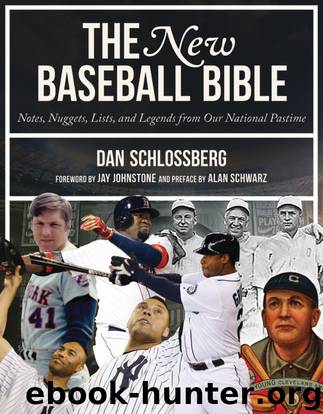The New Baseball Bible by Dan Schlossberg

Author:Dan Schlossberg
Language: eng
Format: epub
Publisher: Perseus Books, LLC
Published: 2017-01-06T05:00:00+00:00
Stadium Announcers
Before the advent of sophisticated public-address systems, teams employed field announcers, megaphone men who announced lineups to the fans and served as liaison for both press box and scoreboard personnel.
The most famous field announcer was Chicago’s Pat Pieper, an announcer at lightless Wrigley Field by day and a waiter at night. Long after electronic systems sent megaphones the route of the buffalo nickel and stadium announcers to press box locations, Pieper remained on the field. He was known for his drawn-out cry of “Play Ball!” which he delivered immediately after giving the lineups. Pieper was to Cub fans what Ed McMahon was to Johnny Carson.
Field announcers weren’t paid much, and Brooklyn’s Tex Rickards earned just $5 a game for many years. He made up in popularity what he missed in cash. Dodger fans even gave him a “night” at Ebbets Field.
Rickards was one of the best, but he wasn’t flawless. One day coats were hung along the left-field railing and the umpire suggested they might interfere with play. Rickards boomed, “Attention please! Will the fans along the left-field railing please remove their clothing?”
A close relative of the early megaphone man was the downtown hawker. In the ’20s, a San Franciscan proved so good at this job that he won the nickname “Foghorn” Murphy. He paraded up and down Market Street, urging fans to see the San Francisco Seals in action. When the team moved into Recreation Park, with its field-level bar in full operation, he didn’t have to work as hard.
The coming of the PA system allowed fans in all corners of the park to hear each announcement. Bob Sheppard, the subtle and classical voice of Yankee Stadium, announced many of the game’s greatest names through continuous World Series action. But Sheppard’s contribution was more than oral; he developed into the team’s poet laureate and, in 1961, penned this poem for Roger Maris just after his 61st home run:
They’ve been pitching me low and wide and tight
I’ve been tense and nervous, drawn and pallid
But my prayers are full of joy tonight
Thank you, God, for Tracy Stallard.
Organists
Gladys Goodding, the organist at Ebbets Field, Brooklyn, probably was the best-known musician in baseball history. She won her spurs the second day on the job—May 9, 1942—when she played “Three Blind Mice” as umpires Bill Stewart, Ziggy Sears, and Tom Dunn walked onto the field. The fans roared.
Goodding, who also played for boxing matches at St. Nicholas Arena and for hockey, basketball, and fights at Madison Square Garden, knew Stewart because the umpire was a hockey referee in winter. Stewart knew she had taken the organist’s job at Ebbets Field and had just finished telling his umpire partners that she was his friend. At that instant, she broke into “Three Blind Mice.”
Sears and Dunn looked at Stewart. “I thought you said she was a friend of yours!” they declared.
The talented organist, who began her professional career by playing background music for silent movies, first attracted the attention of sports fans in the winter of 1936–1937, when she worked Sunday afternoon hockey at the Garden.
Download
This site does not store any files on its server. We only index and link to content provided by other sites. Please contact the content providers to delete copyright contents if any and email us, we'll remove relevant links or contents immediately.
| Coloring Books for Grown-Ups | Humor |
| Movies | Performing Arts |
| Pop Culture | Puzzles & Games |
| Radio | Sheet Music & Scores |
| Television | Trivia & Fun Facts |
The Infinite Retina by Robert Scoble Irena Cronin(6249)
Harry Potter and the Cursed Child: The Journey by Harry Potter Theatrical Productions(4506)
The Sports Rules Book by Human Kinetics(4386)
Molly's Game: From Hollywood's Elite to Wall Street's Billionaire Boys Club, My High-Stakes Adventure in the World of Underground Poker by Molly Bloom(3536)
A Knight of the Seven Kingdoms by George R R Martin(3371)
How To by Randall Munroe(3115)
Flowers For Algernon by Daniel Keyes(3110)
Quidditch Through the Ages by J.K. Rowling(3100)
Quidditch Through the Ages by J K Rowling & Kennilworthy Whisp(2971)
Stacked Decks by The Rotenberg Collection(2883)
Quidditch Through the Ages by Kennilworthy Whisp by J.K. Rowling(2860)
Quidditch through the Ages by J. K. Rowling(2793)
776 Stupidest Things Ever Said by Ross Petras(2780)
Quidditch Through The Ages by J. K. Rowling(2765)
Ready Player One: A Novel by Ernest Cline(2724)
What If?: Serious Scientific Answers to Absurd Hypothetical Questions by Randall Munroe(2705)
Beautiful Oblivion by Jamie McGuire(2607)
The Book of Questions: Revised and Updated by Gregory Stock Ph.d(2572)
Champions of Illusion by Susana Martinez-Conde & Stephen Macknik(2451)
